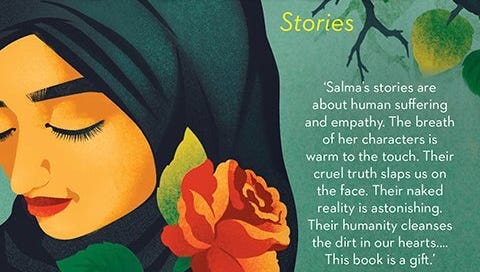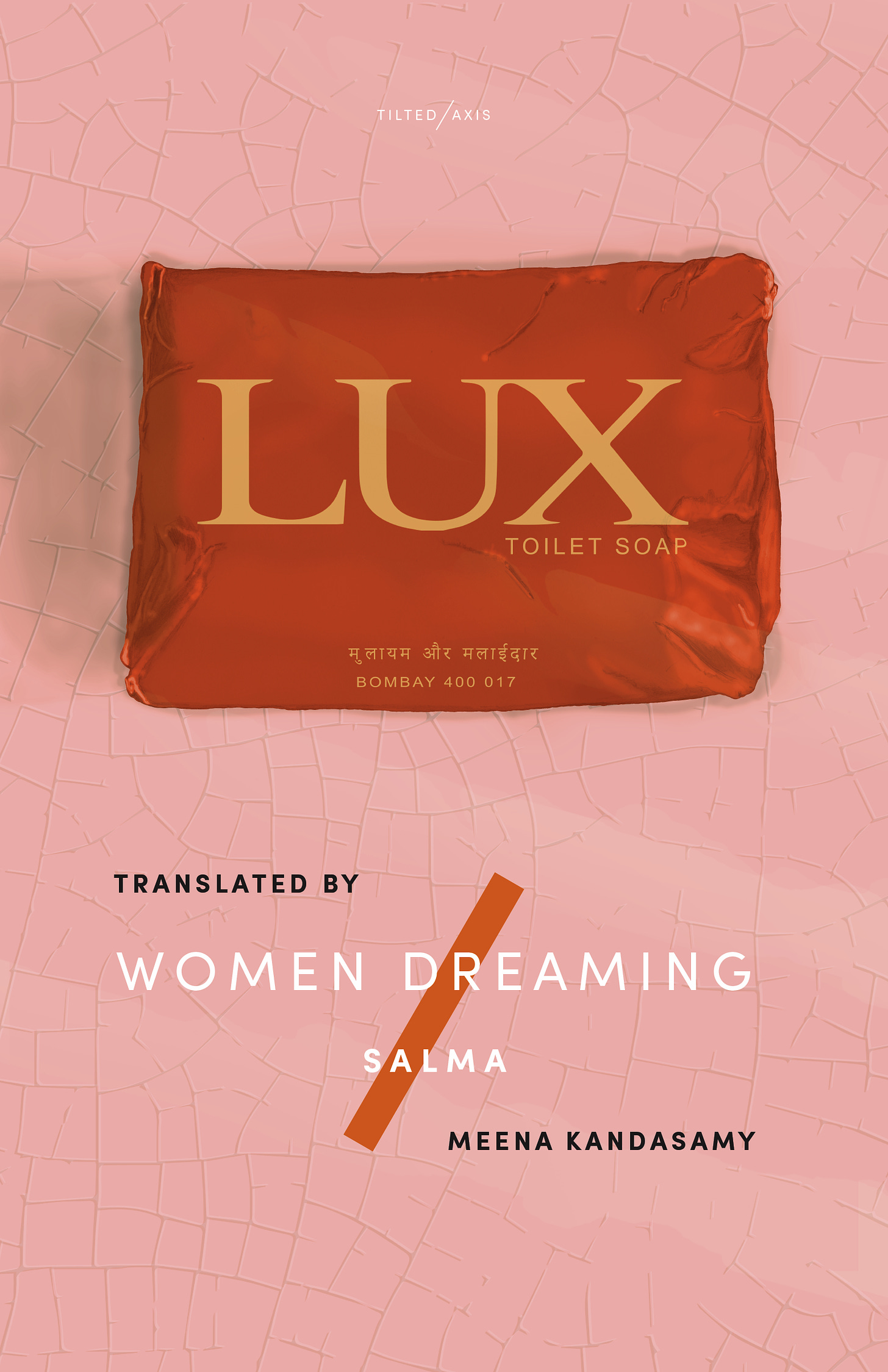Dear Reader,
Yes yes, long time no see. I wanted to highlight a SUPER AMAZING book that I read last weekend. But then there were TWO and I wanted to write about both, because... (read on, you’ll thank me later). But sadly I couldn’t read as fast as I thought I could. So here I am, a little late, but with stuff that’s worth the wait.
Read
I inhaled the short stories in The Curse by Salma, translated by N. Kalyan Raman from Tamil, sent to me recently by Speaking Tiger. Short story collections are tricky to read and review but when stunning books as these get published, it is good news for all. Salma’s women come from Muslim households in Tamil Nadu and they stare at you in the eye as they tell their stories. In On the Edge, an elderly woman cannot stand another one (Raadhi doesn’t bathe and she stinks, eats like a glutton and also farts in car) and doesn’t want to sit next to her in a car journey but the story becomes quiet and sad as it ends. In Trap, a woman is in a constant state of fear and can’t sleep. The titular The Curse is a shocking, heart breaking story that lets us peep into the dreams of a girl who is met with a difficult question on her wedding night and Black Beads and Television set is about some village folks, a TV and a woman who loves watching it.
A question to you before the next story, how many men have we heard farting loudly in public or in homes? And how many women? The short story, Toilets in the collection utterly shattered me. I broke into tears reading it. As clear from the name, it tells of the many problems that women in India face regarding toilets. In the story, a woman is trained from an early age to not walk (walk!) to toilet if men folk are around the area. She learns to hold her urine (haven’t we done this on long journeys because of the lack of good public toilets), and gets health problems. She is aghast at the thought of taking a dump when men folk are outside the toilet because what if they hear! (this is something that bothers me too. Nobody told me or trained me or something like in the story, but I do have the worry at the back of my head — 'what if somebody hears the noises of the basic human bodily functions!' I don't like it when there are people right outside the toilet when I am inside).
We see several women in this story and the different ways in which the toilet-situation affects them — hiding sanitary napkins from men, drying clothes/rags used during periods, going early in the morning in groups to take a dump and leave before the men awake. There was a scene where a widow had to have restrictions on her natural bodily functions (not saying much so that you can read it) because her husband died! This story broke me. If you are a woman, you will read this and cry. You might be facing none of the problems that the women in this village face — you might have your own good toilets and privacy and yet you will well up! It also makes you wonder why we, even in this century, think shitting, peeing, farting, are unfeminine. Seriously! I didn't even know many women fart more during their periods and it is a normal thing, until someone on Twitter said it.
Probably Salma’s biggest strength is in creating characters that stay etched in your minds long after you read them. I promptly moved onto Women Dreaming, a novel by Salma, and translated by Meena Kandasamy, sent to me by Tilted Axis Press. We follow three generations of women of Muslim households in Tamil Nadu. There are mothers, widows, unmarried aunts, and friends.
Mehar, married to Hasan, divorces her husband. But she remarries within two weeks because of her circumstances. Parveen, in an unfulfilling marriage and later singledom, masturbates and finds pleasure. She also fears about pleasuring herself in the shower because the door doesn’t have a sturdy lock and anyone might walk in. Parveen’s blind great aunt, Aminah has remained unmarried and has sharp ears eavesdropping on her phone conversations. Mehar is stifled between two marriages and her rights over her children (the mother loses the right to her children when she remarries) but she is also taken aback when she goes to Kerala with her second husband (who has a shop at Kannur) and see women lead a life with more freedom. Her mother Asiya is hysterical about Mehar’s first divorce. Mehar’s daughter Sajidha longs to be a doctor but also adores her father who seem to want to give her a religious education and marry her off.
There are affairs, secret phone calls, child marriages, second marriages, divorces, bickering between the women in-law, a unique bond between sisters-in-law, teenage daughters, and family secrets. The men are always present as intimidating characters or perpetrators of patriarchy whether as Mehar's first husband Hasan who wants his wife to be clad in burqa and not wear even an anklet who would rather marry again than use condoms or Parveen's husband Rahim with his sex problems remaining a secret take precedence over abandoning an understanding wife or the village elder, Hanifa Hazrat, who goes by the book only. What if men want to inspect your phone calls? Is going on a school trip okay? — So many questions haunt the characters in the novel.
Reading Women Dreaming was like being there, right beside these characters. I felt helpless. I cheered at their small victories. I prayed they will always have luck on their side. Salma exposes the system and the conservativeness that strangles women. She doesn't preach but shows us the power of sisterhood and understanding among women who have different opinions and aspirations. She makes us wonder about choices, conditioning and chains. Salma is no doubt a powerful contemporary voice. I loved both the translations —Kandasamy and Kalyan Raman have done great justice to her words and their power. K. R. Meera says “Salma transforms ordinary lives into sagas of identity, gender and nationalism” and I cannot think of better words to describe her work.
Both books were 4.5 stars for me (I would recommend both because you will experience such a THIRST for more by Salma after you read one book). It is such joy to read an Indian writer who explores women’s desires, sex and dreams with passion and truth. She takes us straight into the heart of ordinary women’s lives and the hypocrisy of religions, institutions and societal barriers. I know that whatever Salma writes (gets translated) next, I am definitely reading it.
Watch
I’ve written a lovely list of 7 slow burn Korean dramas on Huffpost In to give you company in the colder months of the year. There’s a Pinterest board meets dark fairytales drama, police procedurals, time bending dramas, crime mysteries and workplace politics. Pick one for your hot chocolate weekends.
If you missed
The JCB Prize for literature 2020 winner was announced. And the winner was my favourite book in the list. Moustache is a heavy, but worthwhile read, filled with folk lore, and deep in the ecology of Kerala. Check out the mini reviews of all shortlisted titles and pick the book that’ll suit you the most.
Amazing links
Is Norway's friluftsliv (free-life-air) the answer to surviving a second lockdown? (Morwenna Ferrier, The Guardian)
Instructive rather than conceptual, typical friluftsliv activities include relaxing, fishing, hiking, sleeping in “camping hammocks” (not tents) and picking cloudberries. Its symbol is the campfire and its mantra is “man’s right to roam”.
Can you really tell if a kid is lying — talk by Kang Lee — was so fascinating and I am amazed by the new technology proposed although the last minutes of possible use seem like being in a dystopia and I never want that
Beth Harmon’s wardrobe has hidden meanings — loved this piece (Julia Hobbs, Vogue In)
PS: If you haven’t watched The Queen’s Gambit yet, add it to the watchlist. It is fascinating for non-lovers of chess too.
How I Am Using My Grandfather’s Philosophy of “Repotting” Myself Every 5 Years (Courtney Jay Higgins, The Good Trade)
“According to my grandfather, we are not so different than house plants”
Comic : A Day at the Park about questions and answers (Kiriakakis)
For awesome books, new and old, and movies,
Sign up for TWO months of FREE Scribd using my Invite Link.
That’s all for now. Hope all is well at your end. Also, we are nearing to the end of 2020, and if the year has taught us anything, it is about the value of small moments and time. So skip books and TV shows that don’t bring you joy, and the ones that everyone loved but you are feeling meh about. Spend your time on what you love. Eat well, and stay hopeful.
Until next time,
Resh x
(This newsletter may contain affiliate links which might earn me a very small commission at no extra cost to you)
If you liked this newsletter, the best way to show support would be to forward the subscribe link to a friend or share via your favourite social media. Also write back to me.






